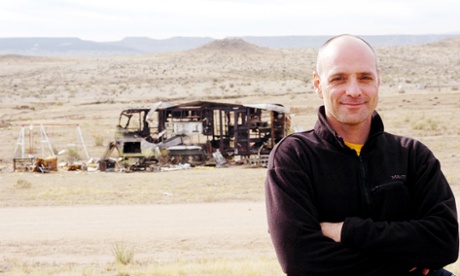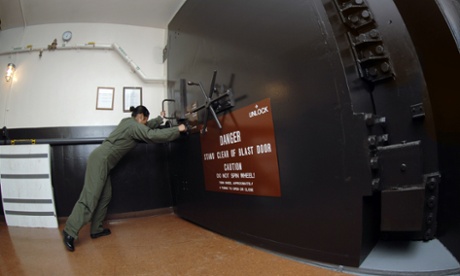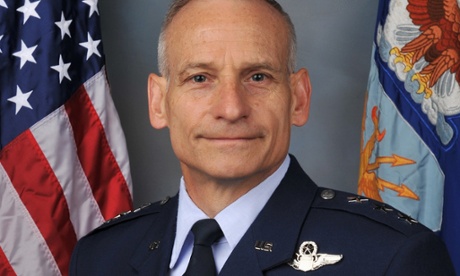
For his latest book, Command and Control, the American author Eric Schlosser spent six years immersed in the world of nuclear weapons. He discovered example after example of mistakes and near missesand became deeply concerned about the state of America's nuclear arsenal.
Those concerns were brought into focus again this week, when US air force officials said officers entrusted with the launch keys to long-range nuclear missiles had twice this year been caught leaving open a blast door that is intended to help prevent a terrorist or other intruder from entering their underground command post.
Earlier this month, the two-star general in charge of US intercontinental nuclear missiles was fired, for "personal misbehaviour".
I spoke to Schlosser about just what is going on with the people in charge of America's nuclear weapons.
Ed Pilkington: It’s been a lively few days in the realm of nuclear weapons mishaps. As well as the incidents mentioned above, there have been a spate of inspection failures of various nuclear units. What on earth is going on?
Eric Schlosser: It looks like there's poor morale and poor leadership in the air force units responsible for nuclear weapons. People are getting sloppy – and that's not a good thing.
EP: Having spent most of the past seven years investigating the history of US nuclear mishaps and close shaves for your new book, does this feel to you like a case of deja vu?
ES: I'm actually surprised that these problems keep happening. In 2007, after half a dozen thermonuclear weapons went missing for a day and a half, without anyone at the air force even realizing it, secretary of defense Robert Gates took some strong action. He fired two top air force officials and made clear that mistakes in the oversight of nuclear weapons are unacceptable. That was six years ago, and the air force clearly hasn't gotten the message.
EP: What do you think we can learn from the fact that mishaps like this are still occurring? And how does it tie into the theme of your book?
ES: The command and control of nuclear weapons requires constant vigilance. These are the most dangerous machines ever invented – and any complacency about them greatly increases the danger. In the book, I wrote about "the Titanic effect", an attitude that provides a false sense of security. The more impossible a serious accident seems to be, the more likely it becomes.

EP: Let’s break down the events and have a look at them a little closer. This week we learnt that there have been two incidents this year – one in April at the 91st Missile Wing at Minot air force base in North Dakota, the other in May at Malmstrom air force in Montana – in which blast doors were left open while one of two launch officers was sleeping,which is against the rules designed to prevent intrusion. In one case, an officer even lied about having been asleep, before later admitting it, and in the other one of the officers left the concrete and steel door ajar so they could receive a food delivery. How serious is that as a breach of regulations, and should we be worried about it?
ES: We should be concerned. As I learned during my research, for every incident like this we hear about, countless others take place without ever being made public. Checklists, standard operating procedures and strict rules are absolutely essential for nuclear weapon safety. Leaving a blast door open when someone's taking a nap is a sign of poor discipline. Launch officers shouldn't be breaking rules and then lying about it.
EP: Two commanders have been dismissed this month – major general Michael Carey, who was “relieved of his command” because of loss of trust and confidence in his leadership in charge of all the air force’s 450 intercontinental ballistic missiles, and vice-admiral Tim Giardina, who was sacked as deputy commander of US nuclear forces following allegations that he used counterfeit chips in a gambling casino in Iowa. Now, there is no suggestion that either man was dismissed for issues relating to their direct work with nuclear weapons, but they were both very senior in the nuclear weapons hierarchy. So again how worried should we be?
ES: Right now Curtis LeMay, the tough general who led the Strategic Air Command during the 1950s, is probably spinning in his grave at a few thousand RPM. It's extraordinary to have two high-ranking officers, with so much authority over nuclear weapons, displaying such poor judgment. Their personal behaviour could have left them vulnerable to blackmail. And you want people who are emotionally stable controlling our nuclear weapons.
EP: There have also been a series of recent inspection reports that have failed various aspects of the nuclear weapons control operation. In August, the 341st Missile Wing at Malmstrom air force base, which has responsibility for operating a third of the US land-based nuclear arsenal, failed a safety and security inspection. That sounds serious.

ES: And a few months before that, 19 launch officers at Minot air force base were removed from duty after violating safety rules. This is not good. Lieutenant General James Kowalski, the officer in command of all the air force's nuclear weapons, said in July that the threat of a Russian nuclear attack on the United States was "such a remote possibility" that it was "hardly worth discussing". Kowalski added that "the greatest risk to my force is an accident … [someone] doing something stupid". I agree with him. The biggest nuclear threat that the United States faces at the moment may be its own weapons.
EP: For your average American, it must be very hard to make sense of this stuff. Is the system in meltdown? Are these minor hiccups? It’s notable that after each of these incidents, the military brass have come out very quickly and said that everything is fine, there is no reason to fear any danger of something really going wrong with a nuclear bomb. Yet after reading your book, it is clear they have been saying that for years. As you recently disclosed with the Guardian, previously unpublished documents show that the US came within one safety switch of detonating a nuclear bomb over Greensboro, North Carolina, in 1961.
ES: These are not minor hiccups. These are signs that something has gone seriously wrong, that a system once operated with efficiency and strict discipline is breaking down. It's happened before. After the Vietnam war, widespread disillusion in the air force led to a good deal of illegal drug use – even on the job. People were smoking pot and handling nuclear weapons. I don't think things have gotten that bad again. But I have no doubt the problems today are worse than the air force will admit.
EP: So is it time for us to start thinking about building nuclear bunkers in our gardens again, like they did in the 1950s and 60s?
ES: No. We just need to remember that the threat of nuclear weapons never went away. We need a strong, vigorous public debate about these weapons. And we need to make sure that launch officers not only close those blast doors, but lock them.
Δεν υπάρχουν σχόλια:
Δημοσίευση σχολίου